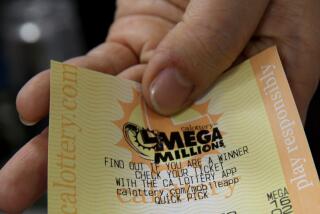Lottery revenue falls again
- Share via
SACRAMENTO — Even the California Lottery is getting hit by the bad economy.
The agency is reporting a precipitous drop in ticket sales that will hurt schools and could undermine the governor’s plan to use lottery funds to balance the state budget starting next year.
Lottery revenue dropped $260 million, or 8%, for the fiscal year ending June 30. It was the second year in a row that ticket sales had declined.
With a percentage of lottery revenue dedicated to education, the dive in sales means $106 million less for schools this year and $186 million less than was provided three years ago.
State Sen. Dean Florez (D-Shafter), chairman of a Senate committee that oversees the lottery, blamed the drop on “the sour economy” and a decline in disposable income of potential ticket buyers.
Similar drops in lottery sales have been seen in other states hit especially hard by the economic downturn, including Florida, Texas, New Hampshire and Maine.
“Lotteries all over the country are down,” said Richard McGowan, a Boston College professor of economics who has written books on the gambling industry.
“The primary engine of growth for lotteries previously was instant tickets: the scratch tickets for $1, $5, $10 and even $20,” he said. “But given the price of gasoline and the state of the economy, people have stopped buying these tickets. They no longer have the discretionary income to fuel the sales of these instant tickets.”
The last recession in California began in April 2001. Lottery revenue was flat the next year and then declined 4% in 2003. After that, it rose -- until two years ago.
The new numbers raise questions about Gov. Arnold Schwarzenegger’s plan to borrow against increasing future lottery money to generate $5 billion starting next year to balance the state budget, said Florez and Sen. Sheila Kuehl (D-Santa Monica).
“It makes it hard for the governor’s plan to balance future budgets,” Florez said, “but it certainly argues for updating the game to make it more attractive, meaning giving people the product that they want, rather than keep doing the same thing over and over again.”
State Supt. of Schools Jack O’Connell said the drop in lottery money for education is “another warning signal to our schools” and an indication that the governor and Legislature need to increase education funding from other sources.
“It’s a concern,” he said.
The new numbers show that the governor’s budget proposal “relies on unrealistic assumptions for lottery revenue in the future,” O’Connell said.
Schwarzenegger, undeterred by the latest figures, still believes lottery revenue can be increased significantly if the games are modernized, said his spokesman, Aaron McLear.
“The sales are down under the old, outdated system that we are working to change,” McLear said. “This doesn’t change our ability to improve upon the lottery and securitize its future earnings. It underscores it.”
Lottery officials agree that sales have been hurt by problems such as high unemployment and inflation, but they say changes to the lottery can turn sales around and make them more competitive in a state where more slot machines are being installed in casinos. In particular, restrictions on the amount that can be offered for prizes, currently 53% of the budget, are also hurting the game’s performance, said Al Lundeen, a spokesman for the lottery.
The numbers “show that the lottery needs greater flexibility when it comes to the amount of money we dedicate to prizes,” Lundeen said. “More prizes equal more players and greater revenue.”
He said states such as North Carolina that have increased their prizes have seen a boost in lottery sales.
Schwarzenegger has proposed a ballot measure for as early as next spring that would provide more flexibility in the operation of the lottery.
As part of this year’s budget, the Legislature approved a proposition that would change the purpose of the lottery by adding language saying it could be operated to help support education “and other public purposes.”
The measure would also allow the Legislature to borrow against future lottery revenue. A separate bill approved this year by the Legislature reduces from 16% to 13% the amount allowable for administration of the lottery, and permits the Lottery Commission to increase prize payouts as “determined by the commission.”
At the same time, the commission has taken steps to improve marketing of the games, highlighting the large number of people winning money every week and offering such prizes as free gas to winners.
In addition, the “Big Spin” television show will be revamped starting in January with the new title “Make Me a Millionaire.”
Lottery players buying tickets Wednesday at the Midtown Market in downtown Sacramento confirmed that bigger rewards might get them to put more money on the line each week.
“If the jackpot was a lot higher, I would buy more tickets,” said Nick Gonzalez. At the same time, he said, if times get any rougher, “one of the first things to go” will be his $1- to $2-a-week splurge on the lottery.
--
More to Read
Sign up for Essential California
The most important California stories and recommendations in your inbox every morning.
You may occasionally receive promotional content from the Los Angeles Times.











